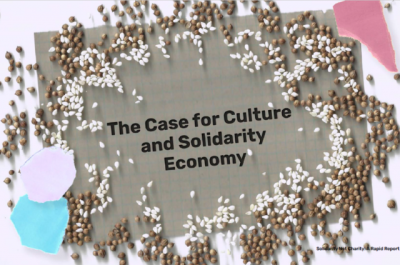Transforming arts and cultural grantmaking

“What would the cultural economy be like if it loved Black and Indigenous people?” This is the question posed by a recently released report on arts and cultural grantmaking in the United States.
Solidarity Not Charity: Arts and Culture Grantmaking in the Solidarity Economy is a rapid report, with supporting video and website, created for Grantmakers in the Arts by Nati Linares and Community Economies Research Network (CERN) member Caroline Woolard.
The report (and video and website) encourages grantmakers to shift from being experts and curators to supporters and co-learners who are following the lead of Black, Indigenous, People of Color, disabled, queer, trans, and working class creative people as they build economic democracy in their communities now.
Woolard and Linares explain, “We aim to shift grantmakers’ mindset, practices, programs, investments, endowments, and policy advocacy so they can support interconnected, locally-rooted models of community ownership and democratic governance to flourish in the arts and cultural sector and beyond.”
“This repairs inequity in the sector and allows those who have been most harmed by our current systems to achieve cultural, economic, and political power.”
The report highlights current inequities including that roughly 40 percent of Native people gain income from arts- and culture-based practices, and yet foundations give less than half of one percent to Native artists. Similarly, only around half of one percent of annual foundation giving directly supports women and girls of colour.
Woolward and Linares write, “2020 has been a year of reckoning and political unrest, and neither the cultural economy nor the larger economy are working for most people. The racial and economic injustices that are embedded in the system are no longer being tolerated silently in the cultural sector.”
“The COVID-19 death rate of Black and Indigenous people in the United States is more than twice the COVID-19 death rate of white people; yet, foundation giving in 2020 documented that only 5 percent of pandemic-response dollars were intended for communities of colour.”
“But there are grantmakers who are playing a role in transforming the sector by following the lead of Black, Indigenous and People of Colour who are actively building alternatives to business-as-usual to create economic and racial justice in the sector and beyond."
“The report (and video and website) features grantmakers that are engaging in systems-change work to address root causes rather than symptoms of inequity.”
The report, video and website also describes a series of strategies that grantmakers can use to change their practices, ranging from internal work and governance shifts to using new types of tools and support to engaging the policy advocacy.
The report, video and website is based on interviews and conversations with over 60 artists, culture-bearers, and grantmakers, including CERN members, David Bollier (Director, Reinventing the Commons Program, Schumacher Center for a New Economics), Craig Borowiak (Associate Professor of Political Science, Haverford College), Binna Choi (Director, Casco Institute, Netherlands) and Maliha Safri (Chair and Associate Professor of Economics, Drew University).
A review of over 300 literature and media sources was also undertaken, and the report and website features a list of the top ten resources including Leeway’s transition from a white-led family foundation to one that is now led by a multi-racial community board that supports women and trans artists working on social change; the anticapitalist wealth management firm Chordata Capital, which supports investors to divest from Wall Street and shift their money into community-controlled investments that center racial and economic justice; and Jessica Gordon Nembhard’s book Collective Courage: A History of African American Cooperative Economic Thought and Practice.
Alongside the dedicated website, https://art.coop/#welcome, which has a host of resources, there are the following social media links and resources:
Twitter: https://twitter.com/_artcoop
A report commissioned by @grantmakersinthearts
Instagram: https://www.instagram.com/_artcoop/
Video: https://vimeo.com/527951208
Jenny Cameron
